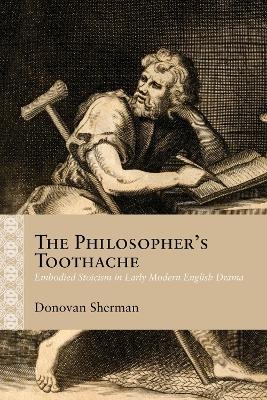
The Philosopher's Toothache
Embodied Stoicism in Early Modern English Drama
Seiten
2021
Northwestern University Press (Verlag)
978-0-8101-4415-6 (ISBN)
Northwestern University Press (Verlag)
978-0-8101-4415-6 (ISBN)
Stoicism—with its focus on bodily sensation, imagined spectatorship, and daily mental and physical exercise—exists as what the philosopher Pierre Hadot calls a ‘way of life’, a set of habits and practices. The Philosopher’s Toothache proposes that early modern Stoicism constituted a radical mode of performance.
The Philosopher’s Toothache proposes that early modern Stoicism constituted a radical mode of performance. Stoicism—with its focus on bodily sensation, imagined spectatorship, and daily mental and physical exercise—exists as what the philosopher Pierre Hadot calls a “way of life,” a set of habits and practices. To be a Stoic is not to espouse doctrine but to act.Informed by work in both classical philosophy and performance studies, Donovan Sherman argues that Stoicism infused the complex theatrical culture of early modern England. Plays written and performed during this period gave life to Stoic exercises that instructed audiences to cultivate their virtue, self-awareness, and creativity. By foregrounding Stoicism’s embodied nature, Sherman recovers a vital dimension too often lost in reductive portrayals of the Stoics by early modern writers and contemporary scholars alike. The Philosopher’s Toothache features readings of dramatic works by William Shakespeare, Cyril Tourneur, and John Marston alongside considerations of early modern adaptations of classical Stoics (Seneca, Epictetus, and Marcus Aurelius) and Neo-Stoics such as Justus Lipsius. These plays model Stoic virtues like unpredictability, indifference, vulnerability, and dependence—attributes often framed as negative but that can also rekindle a sense of responsible public action.
The Philosopher’s Toothache proposes that early modern Stoicism constituted a radical mode of performance. Stoicism—with its focus on bodily sensation, imagined spectatorship, and daily mental and physical exercise—exists as what the philosopher Pierre Hadot calls a “way of life,” a set of habits and practices. To be a Stoic is not to espouse doctrine but to act.Informed by work in both classical philosophy and performance studies, Donovan Sherman argues that Stoicism infused the complex theatrical culture of early modern England. Plays written and performed during this period gave life to Stoic exercises that instructed audiences to cultivate their virtue, self-awareness, and creativity. By foregrounding Stoicism’s embodied nature, Sherman recovers a vital dimension too often lost in reductive portrayals of the Stoics by early modern writers and contemporary scholars alike. The Philosopher’s Toothache features readings of dramatic works by William Shakespeare, Cyril Tourneur, and John Marston alongside considerations of early modern adaptations of classical Stoics (Seneca, Epictetus, and Marcus Aurelius) and Neo-Stoics such as Justus Lipsius. These plays model Stoic virtues like unpredictability, indifference, vulnerability, and dependence—attributes often framed as negative but that can also rekindle a sense of responsible public action.
Donovan Sherman is an associate professor of English at Seton Hall University and the author of Second Death: Theatricalities of the Soul in Shakespeare's Drama.
Acknowledgments
Introduction: More Things
1. Dining with Lipsius
2. We Know the World: Stoic Fate in Marston's Antonio Plays
3. Acting Indifferently: Apatheia in Much Ado about Nothing
4. Unbrace the Air: Stoic Cosmology in The Atheist's Tragedy
5. Othello's Slave
Conclusion: The Dust of the Humanities
Notes
Index
| Erscheinungsdatum | 01.12.2021 |
|---|---|
| Reihe/Serie | Rethinking the Early Modern |
| Verlagsort | Evanston |
| Sprache | englisch |
| Maße | 152 x 229 mm |
| Gewicht | 333 g |
| Themenwelt | Literatur ► Lyrik / Dramatik ► Dramatik / Theater |
| Kunst / Musik / Theater ► Theater / Ballett | |
| Geisteswissenschaften ► Sprach- / Literaturwissenschaft ► Anglistik / Amerikanistik | |
| Geisteswissenschaften ► Sprach- / Literaturwissenschaft ► Literaturwissenschaft | |
| ISBN-10 | 0-8101-4415-8 / 0810144158 |
| ISBN-13 | 978-0-8101-4415-6 / 9780810144156 |
| Zustand | Neuware |
| Haben Sie eine Frage zum Produkt? |
Mehr entdecken
aus dem Bereich
aus dem Bereich
Der Tragödie erster und zweiter Teil. Urfaust
Buch | Hardcover (2021)
C.H.Beck (Verlag)
CHF 15,90


